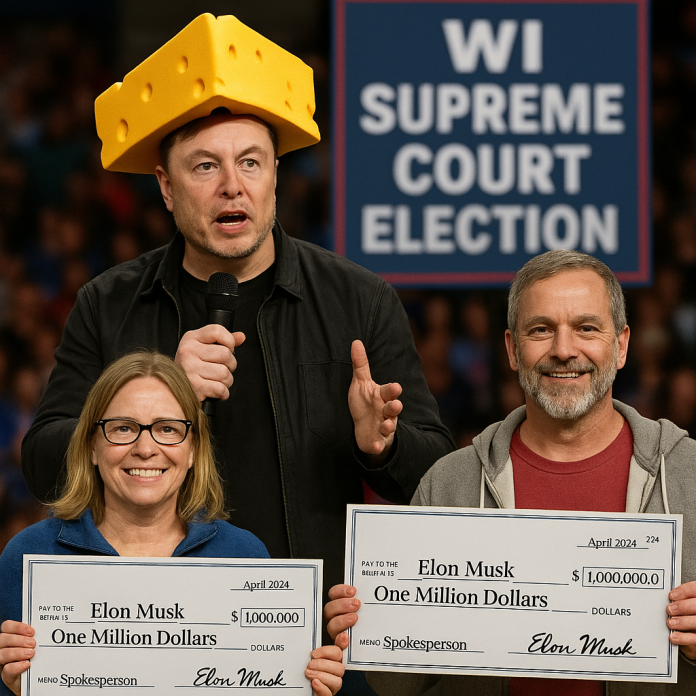In a dramatic turn of events leading up to a critical Wisconsin Supreme Court election, billionaire entrepreneur Elon Musk has attracted widespread attention by distributing $1 million checks to two voters, appointing them as spokespeople for his political group. This bold maneuver has raised significant legal and ethical questions, particularly given Wisconsin laws that prohibit monetary incentives for voting.
During a town hall event in Green Bay, Musk, donning a yellow cheesehead hat, underscored the election’s importance for the ideological direction of the court, which could influence pivotal issues such as redistricting and abortion rights. “It’s a super big deal,” he declared to a crowd of approximately 2,000 attendees, framing the election as crucial for President Donald Trump’s agenda and what he described as “the future of civilization.”
Musk’s political action committee has reportedly invested over $20 million to support conservative candidate Brad Schimel in the upcoming election, seeking to shift the court’s balance, which currently leans liberal. Conversely, Democratic candidate Susan Crawford has garnered support from those opposing Musk’s influence, who label his actions as attempts to manipulate the judicial system.
The legality of Musk’s financial incentives is now under scrutiny. Wisconsin Attorney General Josh Kaul has filed a lawsuit asserting that Musk’s actions violate state law, which explicitly prohibits offering anything of value to induce a vote. Specifically, Wisconsin Statutes § 12.11(1) states that no person may offer or give anything of value to another person in order to induce them to vote or refrain from voting. However, in a recent ruling, the Wisconsin Supreme Court declined to intervene, allowing Musk to proceed with his plans. Musk’s legal team argues that the payments represent a form of free speech intended to foster grassroots movements rather than a direct endorsement of a candidate.
This situation is particularly contentious because, during the last presidential election, Musk operated as a private citizen when he financed substantial campaigns in battleground states. Now, as a special government employee (SGE), his attempts to influence political outcomes through financial means raise serious ethical concerns. As Newspot Nigeria opines, “the distinction between a private citizen and a government official is critical; the former can freely engage in political contributions while the latter is bound by strict ethical guidelines that prohibit such actions.” Specifically, the Office of Government Ethics (OGE) stipulates that federal employees must adhere to ethical standards that prevent them from using their positions to influence political outcomes or offer financial incentives to voters.
Musk, now under the ethical constraints of his SGE role, is prohibited from offering financial incentives to influence voters or political outcomes, actions that could be classified as bribery and may lead to legal repercussions. This transition from private citizen to government official underscores the heightened scrutiny of his actions and the potential conflicts of interest involved.
As the election approaches, the implications of Musk’s actions may resonate beyond Wisconsin. The Supreme Court’s decisions on issues such as redistricting could have lasting effects on the political landscape, potentially shaping congressional control for years to come. With an unprecedented influx of money into this judicial race, the stakes have never been higher.
The unfolding events in Wisconsin serve as a litmus test for the intersection of money, politics, and the judiciary in America. They raise fundamental questions about the integrity of the electoral process and the role of influential figures in shaping political outcomes. As the election nears, all eyes will be on the Wisconsin Supreme Court and the potential ramifications of Musk’s controversial strategy, alongside the ethical considerations surrounding his dual role as a private citizen and a government official.
This editorial opinion is presented by Newspot Nigeria.
Share your story or advertise with us: Whatsapp: +2347068606071 Email: info@newspotng.com














